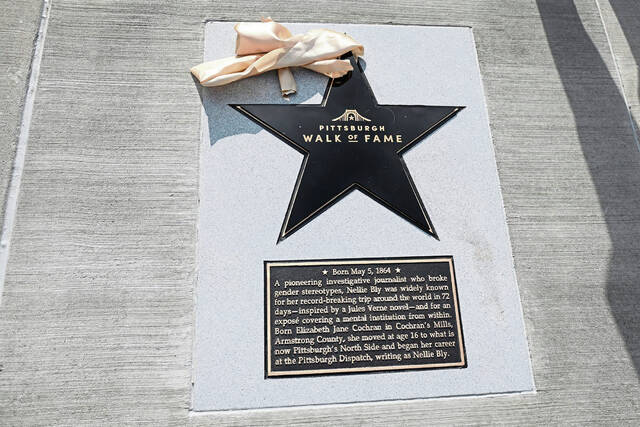https://triblive.com/opinion/lori-falce-from-nelly-bly-to-mary-bruce-women-journalists-dont-tiptoe-around/
Lori Falce: From Nelly Bly to Mary Bruce, women journalists don’t tiptoe around

Sit still. Be quiet. Don’t ask questions.
These are the mantras of a little girl’s childhood.
I learned a lot from my grandmother, like how to make chocolate cake and when a tomato is ripe enough to pick. My mother taught me to flatter a man into thinking my ideas were his. I’m not saying these can’t be situationally valuable skills, but they aren’t much help in journalism.
Every reporter has to learn where the boundaries lie, what the rules are and when to follow those — and when to push them.
Every female reporter needs to add to that dance. Like Ginger Rogers with Fred Astaire, we must do it backwards and in (theoretical) high heels. It is not enough for us to do our jobs well. It is not enough for us to know the subject matter we cover.
We must also not offend men while we do it. Where a man in the same role can be stern, we must be likable and nonthreatening. We must charm without being too charming. Sometimes it helps if we are pretty. Sometimes it helps more if we are not.
I have had the very good luck and very great privilege of excellent examples in my career. Laura Pietro taught me ethics when she sent me, just 17, to cover a council meeting where her father was president, with an order not to let him off the hook. Teresa Bonner never balked at a tough story. Deb Erdley has insatiable curiosity.
And so it was not a surprise to me when recent days have brought multiple examples of women reporting on important issues in Washington, asking hard questions and pushing back against unsatisfactory responses.
It happened on Tuesday when Mary Bruce of ABC News asked a perfectly reasonable question about the presence at the White House of Saudi Crown Prince Mohammed bin Salman. During President Donald Trump’s first term, the CIA determined bin Salman was responsible for ordering the murder and dismemberment of Washington Post journalist Jamal Khashoggi.
The president, sitting in the Oval Office, called her a terrible reporter. When she followed up with a question about the release of the Jeffrey Epstein files, he called her terrible again — twice — and suggested pulling ABC’s license.
That came just days after another reporter, Catherine Lucey of Bloomberg, asked about Epstein during an interaction on Air Force One.
“Quiet, piggy!” the president said.
Trump is not the first politician to disparage the press. He doubtless won’t be the last. This wasn’t his first volley of insults — and again, not likely to end here.
But Khashoggi was murdered for the crime of speaking up to power, namely the royal family of Saudi Arabia. It takes supreme confidence to sit next to a man your own intelligence community has told you orchestrated a complex murder of a journalist — and take the opportunity to insult and threaten a journalist for doing her job.
A journalist’s job is not to persecute or prosecute. We observe, we question and we report. According to Pew Research Center, about 46% of us are women.
Our questions are not worth less because of our gender. Indeed, since the days Nellie Bly started writing for the Pittsburgh Dispatch, we have brought our perspective to critical issues. We have been there to shine a light on war, crime, politics, corruption and the changing landscape of society.
And it might have been a shock to my grandmother and the president, but we are not dancing backwards anymore. We are not sitting still. We are not staying quiet.
And we will keep asking questions.
Copyright ©2026— Trib Total Media, LLC (TribLIVE.com)
